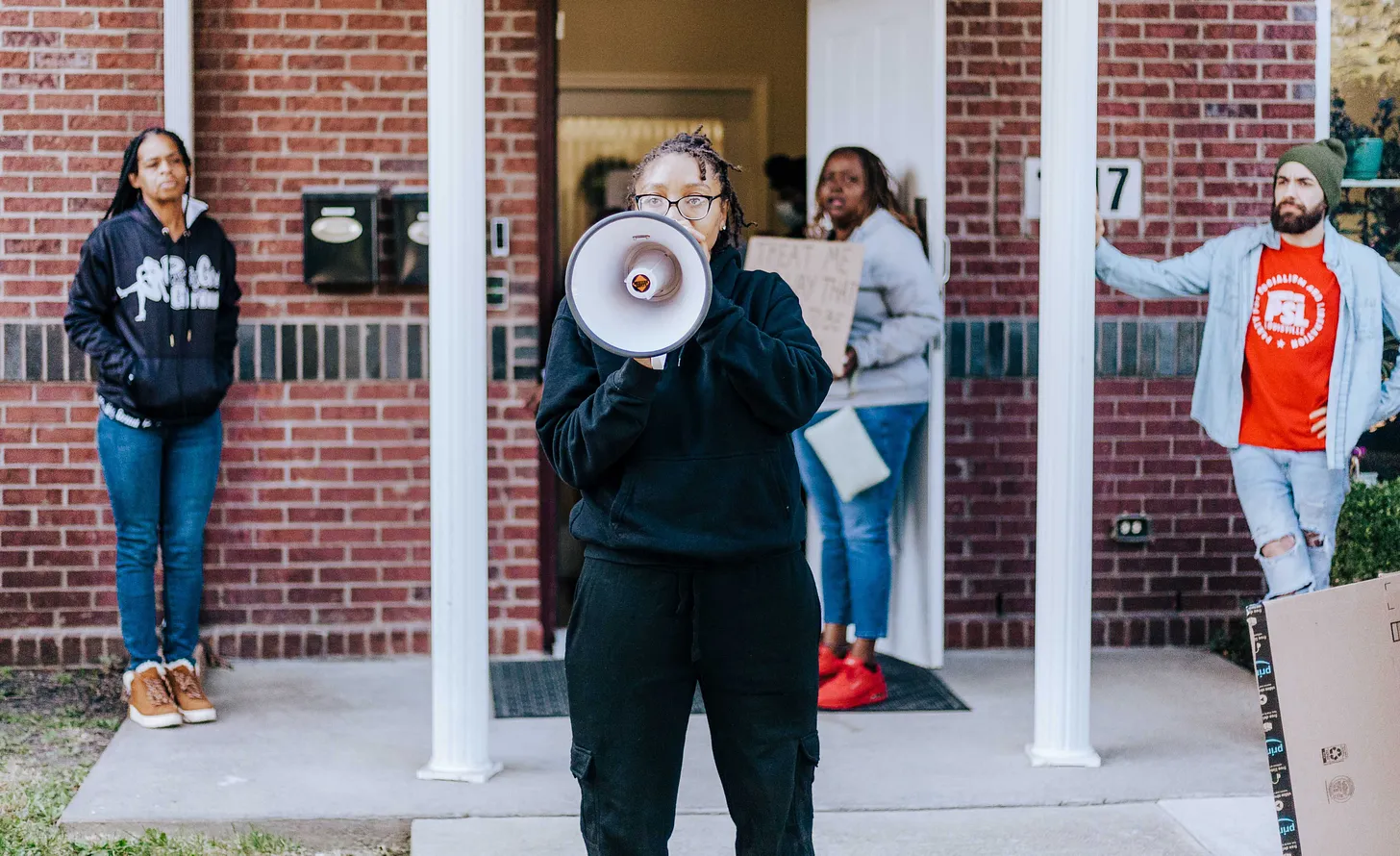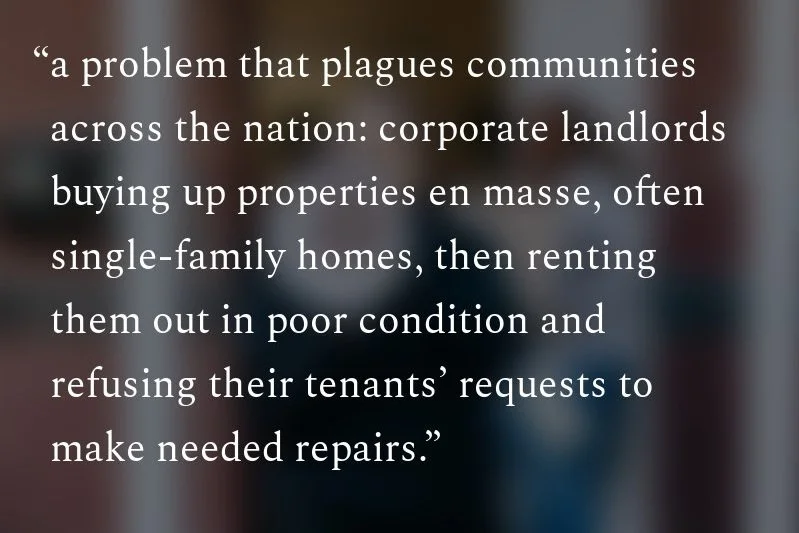Who Can Rein in Corporate Landlords? Tenants Can
Louisville Tenant Union’s Jasmine Harris (Anatheium Photography/Emmett Valentin)
My hometown of Indianapolis is blessed with some terrific reporting on our housing crisis, especially by the Indianapolis Star’s Ko Lyn Cheang and Claire Rafford. We also have many wonderful housing advocates, including the Fair Housing Center of Central Indiana. (Full disclosure: I am privileged to be on the board of FHCCI.)
Cheang’s and Rafford’s latest important article is “’Treated Like Animals’: How a Mega-Investor Turned Affordable Homes Into Rental Nightmare “, which follows a thorough report by the Fair Housing Center, Who Owns Indy’s Houses: A Review of the Largest Single-Family Home Investors. Together, they lift up a problem that plagues communities across the nation: corporate landlords buying up properties en masse, often single-family homes, then renting them out in poor condition and refusing their tenants’ requests to make needed repairs.
Here is how Cheang and Radford began their article:
Ayanna White, 32, moved out of her home for almost three months because her heat wasn’t working in the dead of winter, but said her landlord still demanded she pay rent.
Scheree Robinson’s air conditioning broke in the peak of summer, the stifling heat unbearable, but her landlord told her fixing it was not a priority, she said.
Nancy Hernandez, 22, and her mother, 40-year-old Eloisa Aguilar, discovered the strange sounds and foul smell they’d noticed after they moved into their rental house were from a raccoon infestation in their attic and open sewage leaking into their ventilation, respectively.
These are the experiences of Indianapolis tenants who rent from VineBrook Homes, one of the city’s largest corporate homeowners.
These are horrible stories, and any of us working with renters can tell you a dozen more like them. You may have seen similar articles and reports about corporate landlord misdeeds in The New York Times and Pro Publica.
With corporate landlords’ huge financial resources, which they use to both litigate cases and lobby lawmakers, it is natural to wonder who can stop them. But there is a group ready and able to do so: tenants.
We see proof in places like Louisville , Kansas City, and Charlotte, where tenants are rising up in unions and tenant associations and demanding their landlords improve living conditions. I’ve written in some detail about tenant unions here and here.
We are starting to see some tenant union activity in Indiana too. But those Indiana renters lack a key tool that tenants in many other states possess: the right to respond to poor conditions by putting their rent money into escrow. That way, the landlord will not get paid until the conditions are proved to be acceptable.
One powerful example of tenants using this tool is provided by Roshan Abraham of Next City in his article, “Minneapolis Tenants Are Taking On Corporate Landlords By Putting Their Rent in Escrow”:
When Rachel Jones began renting a single-family home in Minneapolis in 2019, it didn’t take long for problems to start. Within months of moving in, her basement had flooded. Under the water was a live electrical wire.
“I don’t need a flooding basement with electrical wires going through the water when I have little kids that can potentially go down there,” says Jones, a single mother of two children . . .
After getting the runaround and speaking to four separate people, she was told that an emergency request would be written up . . .But days went by without any help or any contact from HavenBrook . . .
Even as her rent has gone up by hundreds of dollars, Jones says that water has been seeping in from the corners of her kitchen floors. After Pretium failed to fix the issue, Jones and other North Minneapolis tenants began putting their rent into escrow, a process by which courts accept rent rather than landlords and then pay it back to tenants if repairs are not made.
Jones began the escrow payments in March and was awarded her first two months of rent by the court. Her rent for May and June is still with the court because Pretium, which had finally addressed some repairs, still did not fix the leaking floor. In total, seven tenants of Pretium homes in North Minneapolis have begun escrow cases.
Here in our state, a broad coalition of advocates is pushing for a similar rent escrow program. Strong research by one of our law students, Jacob Purcell, has shown how badly it is needed here. So far, landlord lobbyists have resisted an Indiana escrow program, but tenants and their allies are still pushing. It is a powerful tool every tenant deserves—and much needed to address the plague of bad-actor corporate landlords.
Supreme Court Rejects Rent Control Challenge—So Far
Speaking of corporate landlords, as reported in this newsletter on September 8th, those landlords have asked the U.S. Supreme Court to overturn well-settled precedent holding that rent control is fully constitutional. Real concern existed because a Supreme Court that is already the most pro-corporate in history was pushed even further in that direction by corporate landlords providing multiple, lucrative gifts to Supreme Court Justices Samuel Alito and Clarence Thomas.
The good news: landlords’ petition for a writ of certiorari in the case of Community Housing Improvement Program vs. City of New York was denied on October 2nd.
The bad news: there are two other rent control challenges in the pipeline, and the Supreme Court could use one or both to strike down rent control, or at least limit it. So we’ll keep an eye on this threat, and let you know if the Court accepts a case that could harm millions of renters current and future.


